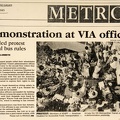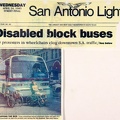Handicapped American, 12/84
Two articles:
Article #1:
[Headline] Anti-APTA Protest Grows as Disabled Demand Bus Lifts
Disabled activists in several states are pressing the attack against the American Public Transit Association (APTA) in an attempt to persuade that organization to support wheelchair accessibility.
At its seventh annual delegate assembly in November, the Coalition of Texans with Disabilities [CTD] urged all transit providers in that state to withdraw from APTA.
“It is the urgent desire of CTD and its 77 organizational members across the state that Texas become a model of full, equal access to all transportation systems," according to the CTD resolution.
CTD President Marshall Mitchell said that APTA'S transportation philosophy “is a powerful tool for discrimination and denies the vast majority of disabled persons equal access to the community."
CTD is also opposed to paratransit as an alternative to wheelchair lift equipped buses because this "provides disabled people only limited use of the locally operated transit systems in all Texas cities."
Mitchell said that not only does paratransit violate the equal protection clause of the l4th Amendment but operating two separate systems "is infinitely more expensive than would be totally accessible systems with only limited door-to-door service to meet the needs of those who could not use mainline service."
APTA is holding a Western Regional Conference in San Antonio in April (see related stories). Meanwhile in November a spokesperson for disabled groups in neighboring Louisiana has requested that APTA's board of directors reverse its position on accessibility.
Susan M. Daniels, in a letter to APTA chairman Warren Franks, said that "disabled people will no longer sit quiet while their rights are abridged."
Daniels points out that the Regional Transit Authority which serves the Greater New Orleans area is not accessible, making it impossible for disabled people in that city to participate on an equal basis in community activities with nondisabled persons.
In California, disabled activists are seeking to cut off the flow of public money to APTA. At its December meeting, the California
Association of the Physically Handicapped (CAPH) passed a resolution calling upon various branches of the federal government to withhold funds earmarked for APTA because such payments represent "a misappropriation of public funds."
More than 60 percent of APTA's operating money comes from public funds, according to the CAPH resolution. CAPH charges that this money is being used in part “to deny handicapped individuals the benefits of transportation services requiring federal financial assistance."
In addition to blocking the flow of federal dollars to APTA, CAPH urges "that all public transit agencies be prohibited from paying APTA dues" while any investigations of APTA are in progress.
Article #2:
[Headline] Texans Plan San Antonio Showdown
Chances are if you board a public bus anywhere in Texas you won't find any riders in wheelchairs.
That's all going to change if Jim Parker of El Paso has anything to do about it. Parker and several other people in wheelchairs from across Texas have organized the state chapter of the American Disabled for Accessible Public Transit (ADAPT), a new national group that is trying to force bus companies and manufacturers to equip all buses with wheelchair lifts.
In 1979, the Carter administration's Department of Transportation
mandated such a policy, but the American Public Transit Association (APTA) successfully fought those regulations in court, arguing that it was a judgment best left to the discretion of the local transit provider.
Disabled activists argued that such "local option” policies are no different from the old states’ rights arguments used in the South to block integration and lead to policies similar to "separate but equal" laws.
Reagan's Department of Transportation has generally sided with APTA in this dispute and has suggested that paratransit services could provide similar service to the disabled at less cost.
Opponents of lifts argue that they're unreliable. In Houston, Metro's Grumman Flexible buses’ wheelchair lifts were removed because the company said they caused too many maintenance problems.
Continued on p. 4
- Created on
- Thursday 11 July 2013
- Posted on
- Thursday 10 December 2015
- Tags
- 14th Ammendment, 3rd US Circuit Court of Appeals, APTA - American Public Transit Association, APTA suit, CAPH - California Association of the Physically Handicapped, CTD - Coalition of Texans with Disabilities, discrimination, El Paso, Houston Metro, Jim Parker, local option, Louisiana, Marshall Mitchell, New Orleans, paratransit, President Jimmy Carter, President Reagan, San Antonio, separate but equal, Susan Daniels, Warren Franks, wheelchair lifts
- Visits
- 2997
- Rating score
- no rate
- Rate this photo


0 comments